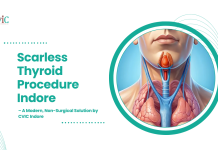Thyroid nodules are abnormal growths or lumps that form within the thyroid gland. While most are benign, they can sometimes signal underlying health issues. Understanding their causes and symptoms is crucial for timely intervention and effective treatment. Medical experts like Shailesh Gupta, Dr. Alok Kumar Udiya, and Dr. Nishant Bhargava at CVIC Indore are dedicated to providing comprehensive diagnosis and treatment plans for thyroid nodules.
Let’s delve into the common causes, symptoms, and how CVIC Indore can help you achieve better thyroid health.
What Are Thyroid Nodules?
Thyroid nodules are solid or fluid-filled lumps that form within your thyroid, a butterfly-shaped gland located at the base of your neck. They are commonly detected through routine physical exams or imaging tests performed for other health issues.
The majority of thyroid nodules are noncancerous (benign) and asymptomatic, but a small percentage can be malignant or cause discomfort and other health complications. Identifying the cause and symptoms early can help guide effective treatment.
Also Read: Top 7 Mild Stroke Symptoms and Effective Treatment Options

6 Common Causes of Thyroid Nodules
Understanding the underlying causes of thyroid nodules is essential for accurate diagnosis and treatment. Here are the six most common causes:
Iodine Deficiency
Inadequate iodine intake is one of the leading causes of thyroid nodules globally. The thyroid gland requires iodine to produce essential hormones. A deficiency can cause the gland to enlarge (goiter) and form nodules.
Multinodular Goiter
When the thyroid gland becomes enlarged and develops multiple nodules, it’s referred to as a multinodular goiter. This condition is common in areas where iodine deficiency is prevalent. Over time, these nodules can grow and cause noticeable swelling.
Thyroiditis
Inflammation of the thyroid gland, known as thyroiditis, can result in nodule formation. Conditions such as Hashimoto’s thyroiditis, an autoimmune disorder, can trigger chronic inflammation, leading to the development of nodules.
Thyroid Cysts
Fluid-filled sacs, or cysts, can develop within the thyroid. While most thyroid cysts are benign, some may contain solid components that require further investigation to rule out malignancy.
Thyroid Cancer
Although most nodules are benign, thyroid cancer remains a possibility. Certain characteristics, such as rapid growth, hardness, or pain, may indicate malignancy. Early detection and intervention are critical for successful treatment.
Genetic Factors
A family history of thyroid nodules or thyroid cancer can increase your risk of developing nodules. Genetic mutations and inherited conditions can also contribute to their formation.
Also Read: How to Cure Stroke Paralysis: Proven Strategies for Recovery

Symptoms of Thyroid Nodules
In many cases, thyroid nodules do not produce noticeable symptoms. However, depending on their size, location, and cause, symptoms may include:
- Swelling or Lump in the Neck: A visible or palpable lump in the neck may indicate the presence of a nodule.
- Difficulty Swallowing or Breathing: Large nodules can press against the esophagus or windpipe, causing discomfort or breathing issues.
- Hoarseness or Voice Changes: Compression of the vocal cords by a nodule can lead to persistent hoarseness or voice changes.
- Pain or Discomfort: Inflammatory conditions or rapidly growing nodules may cause pain or tenderness.
- Hyperthyroidism or Hypothyroidism Symptoms: Depending on their function, nodules can lead to symptoms associated with overactive or underactive thyroid.
How CVIC Indore Can Help
The expert team at CVIC Indore, including Shailesh Gupta, Dr. Alok Kumar Udiya, and Dr. Nishant Bhargava, are dedicated to providing comprehensive care for thyroid conditions. Their approach includes:
Accurate Diagnosis
Using advanced imaging techniques, blood tests, and biopsies when necessary, the experts at CVIC Indore can accurately diagnose the cause and type of thyroid nodules.
Personalized Treatment Plans
Treatment options are customized based on the underlying cause, whether it’s iodine deficiency, autoimmune conditions, or potential malignancy. The team at CVIC Indore ensures that every patient receives the most effective treatment tailored to their specific needs.
Monitoring and Follow-Up
Regular monitoring and follow-up care are essential for patients with thyroid nodules. Shailesh Gupta, Dr. Alok Kumar Udiya, and Dr. Nishant Bhargava provide ongoing support to ensure optimal thyroid health.
Also Read: How to Cure Stroke Paralysis: Proven Strategies for Recovery

FAQs
What are thyroid nodules?
Thyroid nodules are abnormal growths or lumps that develop within the thyroid gland. They can be solid or fluid-filled and are often benign.
How are nodules diagnosed?
Diagnosis typically involves physical exams, blood tests, imaging (such as ultrasound), and sometimes fine-needle aspiration biopsy.
Can nodules cause symptoms?
Yes, large or malignant nodules can cause symptoms such as neck swelling, hoarseness, or difficulty swallowing.
Who is at risk of developing nodules?
Risk factors include iodine deficiency, autoimmune conditions, family history, and certain genetic factors.
Can nodules be prevented?
Maintaining adequate iodine intake and monitoring thyroid health regularly can reduce the risk of nodule formation.
What should I do if I suspect I have nodules?
Consult medical professionals like Shailesh Gupta, Dr. Alok Kumar Udiya, or Dr. Nishant Bhargava at CVIC Indore for an accurate diagnosis and appropriate treatment plan.
Conclusion
Understanding the causes and symptoms of nodules is the first step toward effective management. With experts like Shailesh Gupta, Dr. Alok Kumar Udiya, and Dr. Nishant Bhargava at CVIC Indore, you can receive the best care for your thyroid health. Whether you’re experiencing symptoms or simply seeking preventive advice, their team is ready to help.
Reach out to CVIC Indore today for expert thyroid care!




